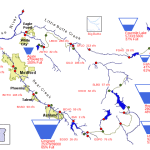Analysis by Dean Silver
The Food and Beverage Tax (FBT) (also known as the “meals tax”) has taken on a prominent role in Ashland politics leading up to this year’s election. There is a lot of confusion about that tax, so it is worthwhile to examine its long history. All of this information has been sourced from the city records website http://records.ashland.or.us . Each reference below is linked to its source document.
1993
Resolution 93-02, adopted 1/19/1993
“A RESOLUTION CALLING A SPECIAL ELECTION FOR MARCH 23, 1993, IN THE CITY OF ASHLAND FOR THE PURPOSE OF REFERRING TO THE VOTERS OF THE CITY A MEASURE APPROVING AN ORDINANCE IMPOSING A TAX ON THE SALE OF FOOD AND BEVERAGES IN RESTAURANTS.”
Ordinance 2707-E, approved 3/23/93
“AN ORDINANCE OF THE CITY OF ASHLAND ADDING A NEW CHAPTER 4.34 TO THE ASHLAND MUNICIPAL CODE CONCERNING RESTAURANT FOOD AND BEVERAGE TAXATION.”
This ordinance, approved by a vote of 3658 to 2980, imposed a 1% tax on basically all prepared food, except whole cakes, pies, and loaves of bread, and that provided by schools, hospitals, and vending machines, and several other exceptions. It was referred to as the “PARK COMMISSION FOOD & BEVERAGE TAX PROPOSAL”.
It stated “All taxes collected by the city under this chapter shall be paid into the Open Space Park Account. Such taxes shall be used for the acquisition of Open Space lands or easements and for such other purposes pertinent to the Open Space Park Program as the Council and Park Commission may jointly determine.”
It also stated “The council may increase the rate of the tax described in subsection 4.34.020.A up to a maximum of five percent after a public hearing.”
The tax was slated to expire on 12/31/2010.
Resolution 1993-15, record missing
“Increasing the Food and Beverage Tax from 1% to 5%”
The record for this resolution is MISSING from the city records for some reason. It is critical to know the verbiage and result of this resolution. Was this expunged deliberately for some reason?
1993-0504 Reg Min, minutes of 5/4/93 council meeting
“4% Food & Beverage Tax Increase. A memo from Finance Dir. Turner was read dated April 30, 1993 regarding wastewater treatment plant financing, and urging Council to either raise sewer rates by 25% or enact the 4% F&B tax increase…. A resolution was read increasing the food and beverage tax from 1% to 5% pursuant to Ashland Municipal Code Section 4.34,020.D., effective July 1, 1993. Hauck moved adoption, Winthrop seconded, and the motion passed on roll call vote with Acklin dissenting. (Reso. 93-15) ”
This is when the FBT increased from 1% to 5%. It was 1% for less than two months before it was increased. It was raised by a vote of council after a public hearing.
Ordinance 2716, adopted 6/15/93
This made no substantive changes, but clarified some of the language in Ordinance 2707.
A citizen initiative entitled “Repeals Food and Beverage Tax” gathered 1480 signatures and was accepted by the city recorder.
Ordinance 2720, adopted 8/4/93
“AN ORDINANCE AMENDING SECTION 4.34.020.A OF THE ASHLAND MUNICIPAL CODE TO ADD ICE CREAM AND FROZEN DESSERTS AS TAXABLE ITEMS FROM COMBINATION FACILITIES.”
Resolution 93-36, adopted 8/17/93
“A RESOLUTION REFERRING TO THE VOTERS OF THE CITY OF ASHLAND A COMPETING MEASURE TO THE INITIATED MEASURE TO REPEAL THE FOOD AND BEVERAGE TAX.”
Faced with a successful citizens’ initiative to repeal the FBT, Mayor Golden and her Council adopted this resolution placing a competing measure on the ballot for November.
Thus, the city was faced with two competing initiatives, similar to this year. One was citizen initiated, the other was council initiated. This year, one is citizen initiated, and one is proposed by the city manager. As of this writing, council is considering whether to endorse one or both or none of the current proposals.
Resolution 93-43, adopted 12/21/93
The results of the November, 1993 Initiatives:
| Initiative 15-1 | Repeals Food and Beverage Tax | yes | 3093 | 49% | no | 3223 | 51% |
| Initiative 15-2 | Repeals F&B Tax if State Sales Tax Adopted | yes | 3432 | 61.2% | no | 2175 | 38.8% |
But the state sales tax was NOT adopted, so that issue was moot. The repeal effort failed by only 130 votes out of 6316 cast. As always, every vote counts.
2009
Resolution 2009-22, adopted 8/4/09
This resolution called for a special election on 11/3/09 to answer the question “Shall 5% tax on prepared food and beverages extend to 2030 for wastewater debt and improvements (80%) and parks (20%)?” Also, “The City Council can reduce or eliminate the tax at anytime.”
Ordinance 2991, adopted 8/4/2009
This is the ordinance that was referred to the electorate by resolution 2009-22.
The final vote was 4,130 yes and 2,894 no.
2016
Resolution 2016-20, adopted 8/2/16
This resolution put before the voters an amendment to the FBT “Approving use of food and beverage tax for street maintenance.”
“The City’s current food and beverage tax ordinance directs 20% of all tax revenues to park land acquisition and development, and 80% of all tax revenues to debt service on the City’s waste water treatment plant. The ordinance for which the City seeks approval would increase the share of tax revenue for parks to 25% and would set aside a fixed amount of revenue for waste water debt, with any revenues not required for that debt directed to the Street Fund for a pavement management program.”
Resolution 2016-23, adopted 8/16/16
This appears to be a reworking of 2016-20, adding this following explanatory statement:
“The City of Ashland first enacted a food and beverage (F&B) tax – a tax on prepared food and non-alcoholic beverages sold by restaurants and caterers in 1993. The tax was created to provide a revenue stream for the acquisition of open space (park land). The City Council subsequently amended the F&B tax to allow its use for debt service on the City’s waste water treatment plant. Of the taxes collected, 20% goes to parks and 80% goes to waste water debt. Passage of this ballot measure will enact an ordinance approved by the Ashland City Council that amends the Ashland Municipal Code to redirect a portion of the City’s food and beverage (F&B) tax revenue to street maintenance and to increase the portion of F&B tax revenue that is directed to the Ashland Parks and Recreation Commission from 20% to 25%. Enough revenue is generated by the F&B tax to fully fund current waste water treatment debt, a pavement management program to overlay or reconstruct all arterial and collector streets and to increase the share of F&B revenue for Parks from 20% to 25% of total collections. The ordinance does not change the current tax rate of 5% and it does not change the tax’s unset date of December 31, 2030.
“If approved, this ordinance will fix the amount of F&B tax provided for waste water debt at a specific number rather than a percentage, and direct tax revenues over that amount to the City’s street fund, where it will be available to pay for street repair, rehabilitation and reconstruction. The street repair program would apply to the City’s arterial and collector streets.”
Ordinance 3133, adopted 8/16/16
This is the ordinance that was referred to the electorate by resolution 2016-23.
Measure 15-156, adopting ordinance 3133, was approved 9,616 yes to 2,590 no.
Thus, Ordinance 3133 was codified in Ashland Municipal Code Chapter 4.34
There have been various other ordinances amending the verbiage regarding peripheral aspects of the FBT over the years, but no others affecting the application of the tax that I could find.
That is the history of the Food and Beverage Tax until the budget hearings in March through May, 2021. It was pretty straightforward until then. But the budget that staff recommended to the Citizens’ Budget Committee proposed an entirely different use for this tax. That’s a story for another day.
This article has been updated to include the competing ballot initiatives in 1993 and the results of that election.






